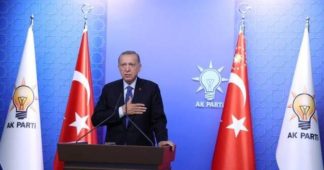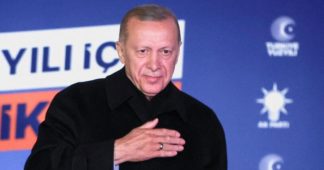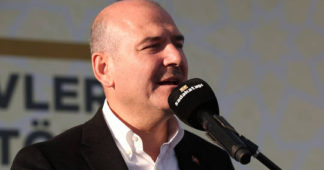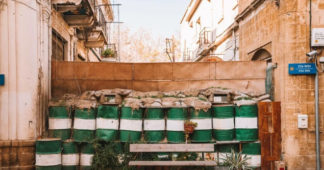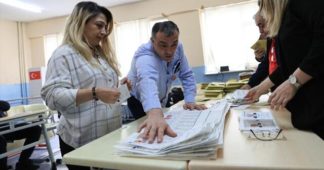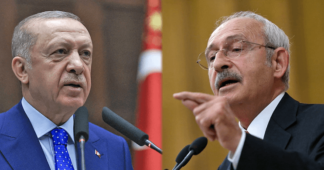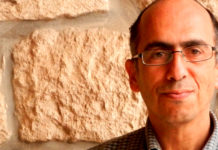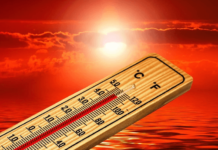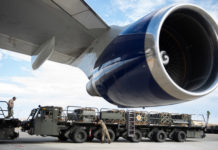The Turkish President won the election run-off on Sunday and now the US and EU will have to work out what to do with Nato’s disobedient member.
May 29, 2023
Cross-posted from Other News
Turkish President Recep Tayyip Erdogan has another five years in power after defeating opposition leader Kemal Kilicdaroglu in Sunday’s runoff election.
Kilicdaroglu was in the impossible position of trying to make up ground by simultaneously keeping the pro-Kurdish Peoples’ Democratic Party voters on board and attracting the voters of nationalist candidates from the first round.
It didn’t work.
While Umit Ozdag backed Kilicdaroglu, another nationalist candidate went for Erdogan. Both candidates’ pet issue was the repatriation of the 3 million-plus Syrian refugees in Turkiye (as well as millions from other countries) – even doing it by force if necessary.
While both Erdogan and Kilicdaroglu were in favor of repatriation, neither had previously gone that far. Kilicdaroglu tried to talk tough on the issue in the two weeks between the election and the runoff, calling for the urgent expulsion of “10 million refugees” in the country, but while his new stance wasn’t enough to win him the election, it did provide a bipartisan blessing for the anti-refugee stance.
One reason Erdogan has been so successful at remaining in power is his ability to move with public opinion. If he continues to do so, Turkiye might see a more dramatic turn to the right. While Erdogan beat expectations in the presidential vote, his party lost seats at the parliamentary level as nationalist parties outflanking him on the refugee issue were the big winners in the elections.
The Nationalist Movement Party gained one spot in the 600-seat Turkish parliament and is now at 10.4 percent – a high amount for a party that has ties to the Ulku Ocaklari, or Grey Wolves, an ultra-nationalist group long associated with political violence.
All in all, far right parties got more than 30 percent of the parliamentary vote as working class and low income voters in both urban and rural areas opted for nationalist and/or Islamist candidates. Duvar reports:
“As one of the most crucial elections of modern Turkey’s history ends, the Turkish parliament now hosts plenty of far-fight MPs while the vote share of the far-right parties is even higher than in the previous elections. …
“Turkey has been experiencing a similar path with its global counterparts. The leftist and center parties struggle to capture the voters who have been facing detrimental consequences of the economic crisis and allured by the far-right discourse.”
As Turkiye’s inflation began to take off in recent years and Erdogan’s government followed an unorthodox policy by continuing to slash rates, purchasing power has been severely eroded as the inflation rate was 44 percent in April and as high as 85 percent last October.
At the same time frustration has risen with the enormous number of refugees and migrants in the country, mostly as a result of the war in Syria. Although Erdogan’s previous support for the overthrow of Syrian President Bashar Assad al-Assad helped create the problem, he ultimately didn’t pay the price at the ballot box. But he will be under even more pressure now to undo the situation his Syrian escapades brought about.
Turkiye has been building housing in areas of Syria occupied by the Turkish army and wants to resettle Syrian Arabs there – possibly to dilute the Kurdish population. Ankara, with the support of Russia, is also working to improve relations with Assad. At the same time, Erdogan’s foreign affairs minister Mevlut Cavusoglu is saying that some Syrian refugees will remain as a source of cheap labor.
Resentment towards refugees and migrants is likely to only grow as Turkiye’s economy faces a perilous path ahead. Erdogan went on a generous spending spree in recent months, moving roughly 500,000 public employees from temporary contracts to permanent positions with strong benefits, hiking pension payments, extended cheap credit for small businesses, and offered early retirement benefits to more than 2 million Turks. The government also raised the minimum wage. The problem is that the country’s runaway inflation lessens the impact of such policies while the long term finances continue to take a hit.
Turkiye had a budget deficit of roughly $12.9 billion over the first three months of this year, and it’s possible it reaches six percent of GDP or higher by year’s end. Turkiye’s hard currency reserves were further drained ahead of the election, which was likely an Erdpogan attempt to boost the lira before voters went to the polls. The country’s foreign currency reserves are possibly in negative territory now. The earthquakes that hit southern Turkey in February will require massive spending, exacerbating these trends.
Pressure in the financial markets continued to build in the days between the May 14 election and Sunday’s runoff. Turkiye’s central bank was forced to ask some lenders to step in and buy the country’s dollar bonds. The country’s sovereign dollar bonds and equities have fallen off a cliff, and the cost of insuring exposure to Turkish debt has jumped.
Should Turkiye’s economy continue to flounder, resentment of the refugees will likely only grow.
The lira began to hit turbulence back in August 2018 when the US imposed sanctions on Turkish exports, and the Erdogan administration has continued to cut interest rates despite the record-breaking inflation.
The rough economic road ahead combined with the refugee situation could help the nationalists continue to add support and is food for thought when thinking about who could potentially succeed the 69-year-old Erdogan if he doesn’t seek reelection in 2028. From Al-Monitor:
“Had they contested the elections as a united bloc, they would have become the second-largest force in parliament after the AKP. In a viral tweet after the May 14 vote, Tugrul Turkes, a prominent nationalist figure who joined the AKP in 2015, declared that “Turkish nationalism is the only true winner of the elections.” It could become the country’s largest political force in the next elections, he continued, if the scattered nationalist groups come together.”
New Cold War Status Quo?
One of the few things going right for the Turkish economy is how it has navigated the conflict between the West and Russia. Ankara has refused to join sanctions against Moscow and has instead only grown closer to its neighbor across the Black Sea.
Exports from Germany to Turkey jumped nearly 37 percent during the first quarter of this year compared to last. Most of those goods are believed to make their way to Russia as a sanctions workaround. Turkey has been in a customs union with the EU since 1995, and the economic relationship is strengthening despite the EU’s public hand wringing over Ankara’s trade with Moscow:
Unless the West unwisely forces Turkiye’s hand (which of course can’t be ruled out), this arrangement will almost certainly continue under Erdogan’s new term.
There were reasons to believe the opposition would have chosen a different course. In previous posts I wrote about the opposition’s mixed signals on Russia and Kilicdaroglu’s odd decision to tour the US and UK last year. It appears Moscow was of the believe the a Kilicdaroglu presidency would have moved Turkiye towards the West. From WSWS:
“A commentary in the pro-Kremlin newspaper Vzglyad explained why Erdoğan, maneuvering between NATO and Russia, was preferred by Moscow: ‘In terms of personalities, most Russian experts were rooting for Erdoğan… there were serious reasons to suppose that in case Kilicdaroglu wins, Turkey will join Western policy of blockading Russia.’
“It continued: ‘That is, simply put, it would abandon Erdogan’s ‘both ours and yours’ line, after which it would rigidly enforce anti-Russian sanctions, supply more weapons to Ukraine and foment the Russian periphery.’”
Erdogan often painted Kilicdaroglu as a western stooge during the campaign – a description that was given more weight when the latter accused Moscow of interfering in the election with deep fake videos despite his charge lacking evidence and commonsense. This likely damaged Kilicdaroglu’s prospects since taking the side of the West in the new Cold War is a toxic position in Turkiye. A December poll by the Turkish company Gezici found that 72.8 percent of Turkish citizens polled were in favor of good relations with Russia. Compare that to the nearly 90 percent who think the US is a hostile country.
Kilicdaroglu also claimed Western money would pour into Turkiye should he win – a claim backed by western financial institutions. According to Bloomberg, “Vanguard Says Erdogan Loss Would Make Turkey Bonds Loved Again.”
Alas, it was not to be.
It remains to be seen how Washington and Europe will react to Erdogan’s victory. It was made clear the West wanted him gone – from Biden’s declaration during his 2020 election campaign that Washington should help the Turkish opposition “take on and defeat Erdogan” to the recent Economist cover with the title “The Most Important Election of 2023” with the tags “Save Democracy” and “Erdoğan Must Go.”
The US has in recent years tried various forms of pressure against Erdogan and Turkiye (sanctions, threat of sanctions, strengthening Greece, arming Cyprus, etc.) all to no avail. The EU has also kicked around the idea of secondary sanctions to stop Turkiye’s role as a go between.
Could we see the West double down on those efforts now? While such policies would only serve to drive Turkiye closer to Russia and China, it’s difficult to rule out any self-defeating policy by the West. The rise in Turkish nationalism demonstrated by the elections will mean even less patience for Washington’s pressure campaigns.
Erdogan will likely continue to try to navigate the middle ground as it’s a profitable space to be. Russia, for its part, continues to offer carrots.
Moscow has helped Ankara prop up its foreign currency reserves with the purchase of Turkish bonds via a scheme involving the construction and development of Turkey‘s Akkuyu nuclear power plant.
On Thursday, Erdogan also said that Gulf states recently sent funding to Turkiye, briefly helping relieve the central bank and markets, and he added that Ankara will show them gratitude after the election.
Another recent agreement between Ankara and Moscow allows Turkiye to postpone up to $4 billion in energy payments to Russia until next year, both sources told Reuters under condition of anonymity. Ankara has already deferred payment of a $600 million natural gas bill. (Prior to the election Erdogan enacted a policy to provide free natural gas to households for a month.) A deal for Turkiye to pay for Russian gas in rubles has also helped Ankara reduce its foreign-currency demand.
Elsewhere, Erdogan could face increased pressure from the more nationalist parliament to take more military action against Kurdish groups in Syria and Iraq, although this would complicate relations with Moscow and Damascus.
Sweden’s path to joining NATO also likely got more difficult. Erdogan has hinted that his opposition to Sweden’s NATO membership application would continue until Stockholm extradites dozens of Kurdish exiles who Turkiye accuses of being terrorists. The strengthened nationalist forces in the Turkish parliament makes it even less likely to ratify Sweden’s accession.
Long term, the nationalists are likely to gain even more power as there are no easy fixes to Turkiye’s economic troubles nor a quick solution to its refugee crisis.
We remind our readers that publication of articles on our site does not mean that we agree with what is written. Our policy is to publish anything which we consider of interest, so as to assist our readers in forming their opinions. Sometimes we even publish articles with which we totally disagree, since we believe it is important for our readers to be informed on as wide a spectrum of views as possible.
